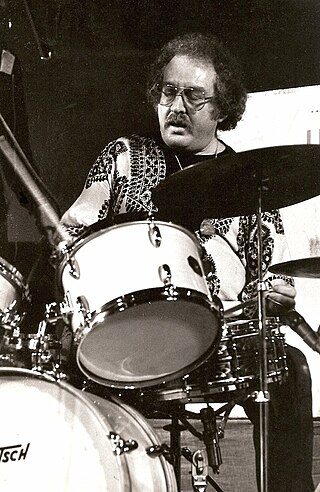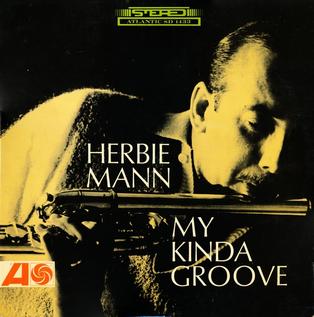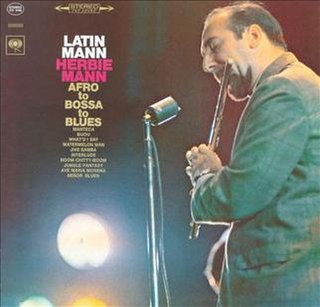
Raymundo "Ray" Barretto Pagán was an American percussionist and bandleader of Puerto Rican descent. Throughout his career as a percussionist, he played a wide variety of Latin music styles, as well as Latin jazz. His first hit, "El Watusi," was recorded by his Charanga Moderna in 1962, becoming the most successful pachanga song in the United States. In the late 1960s, Barretto became one of the leading exponents of boogaloo and what would later be known as salsa. Nonetheless, many of Barretto's recordings would remain rooted in more traditional genres such as son cubano. A master of the descarga, Barretto was a long-time member of the Fania All-Stars. His success continued into the 1970s with songs such as "Cocinando" and "Indestructible." His last album for Fania Records, Soy dichoso, was released in 1990. He then formed the New World Spirit jazz ensemble and continued to tour and record until his death in 2006.

Melvin Sokoloff, known professionally as Mel Lewis, was an American jazz drummer, session musician, professor, and author. He received fourteen Grammy Award nominations.
Joseph Dwight Newman was an American jazz trumpeter, composer, and educator, best known as a musician who worked with Count Basie during two periods.

William Correa, better known by his stage name Willie Bobo, was an American Latin jazz percussionist of Puerto Rican descent. Bobo rejected the stereotypical expectations of Latino music and was noted for combining elements of jazz, Latin and rhythm and blues music.
Bernard Lee "Pretty" Purdie is an American drummer, and an influential R&B, soul and funk musician. He is known for his precise musical time keeping and his signature use of triplets against a half-time backbeat: the "Purdie Shuffle." He was inducted into the Modern Drummer Hall of Fame in 2013.
David Samuel Pike was an American jazz vibraphone and marimba player. He appeared on many albums by Nick Brignola, Paul Bley and Kenny Clarke, Bill Evans, and Herbie Mann. He also recorded extensively as leader, including a number of albums on MPS Records.
Ernest Andrew Royal was a jazz trumpeter. His older brother was clarinetist and alto saxophonist Marshal Royal, with whom he appears on the classic Ray Charles big band recording The Genius of Ray Charles (1959).
Attila Cornelius Zoller was a Hungarian jazz guitarist. After World War II, he escaped the Soviet takeover of Hungary by fleeing through the mountains on foot into Austria. In 1959, he moved to the U.S., where he spent the rest of his life as a musician and teacher.
Benjamin M. Tucker was an American jazz bassist who appeared on hundreds of recordings. Tucker played on albums by Art Pepper, Billy Taylor, Quincy Jones, Grant Green, Dexter Gordon, Hank Crawford, Junior Mance, and Herbie Mann.
Carlos Valdés Galán, better known as Patato, was a Cuban conga player. In 1954, he emigrated from La Habana to New York City where he continued his prolific career as a sideman for several jazz and Latin music ensembles, and occasionally as a bandleader. He contributed to the development of the tunable conga drum which revolutionized the use of the instrument in the US. His experimental descarga albums recorded for Latin Percussion are considered the counterpart to the commercial salsa boom of the 1970s. Tito Puente once called him "the greatest conguero alive today".
Jerry Dodgion was an American jazz saxophonist and flautist.
Rudy Collins was an American jazz drummer born in New York City.
James Joseph Wisner was an American pianist, arranger, songwriter, and producer. He is best known for his 1961 hit single "Asia Minor", released under the name Kokomo.
Bobby Thomas was a Kittitian-American jazz drummer. A member of Junior Mance's trio in 1960, Thomas recorded with the Montgomery Brothers in New York in January 1960.
This is a Herbie Mann discography. Mann spent his early years recording for a number of jazz oriented record labels, and signed with Atlantic Records in 1961. He recorded with them through the 1960s and 1970s, including their subsidiary Cotillion Records, where he ran his own imprint, Embryo Records, in the 1970s, for his records as well as other musicians. Mann also ran two independent record labels, Herbie Mann Music in the 1980s, and during the 1990s, Kokopelli Records. Minor reissues are not noted.

Today! is an album by jazz flautist Herbie Mann released on the Atlantic label featuring performances recorded in 1966.

My Kinda Groove is an album by American jazz flautist Herbie Mann recorded for the Atlantic label and released in 1965.

Latin Mann is an album by American jazz flautist Herbie Mann recorded for the Columbia label and released in 1965. Mann's contract with Atlantic Records allowed him to record the album for another label.

Our Mann Flute is an album by American jazz flautist Herbie Mann released on the Atlantic label in 1966. The album features tracks from sessions that produced the albums The Common Ground (1960), My Kinda Groove (1964) along with more recent recordings.

A Mann & A Woman is an album by American jazz flautist Herbie Mann and vocalist Tamiko Jones released on the Atlantic label in 1967.








